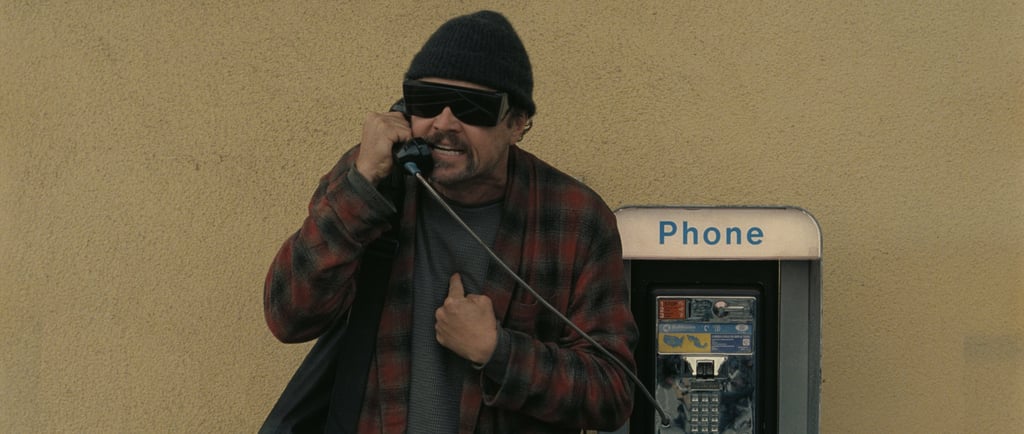One Battle After Another: Paul Thomas Anderson at His Most Entertaining and Vulnerable
REVIEWS
Alaa Tamer
9/26/2025


“One Battle After Another” is an interesting title in many ways: For a commercial film, it is a promise, that the film will have one setpiece after another, one chase/shootout/fight after another. But you could use the phrase about everything or about life itself: surviving life can feel like one battle after another, raising a child is one battle after another, understanding yourself, your world, trying to change its rules and shortcoming, or profiting from them, or just following them. A revolution is one battle after another, maintaining the status quo is one battle after another.
All that could be applied to this “thriller” from the always Genre-bending Paul Thomas Anderson, a fast paced, emotionally gripping, unexpectedly funny, adrenaline filled ride that is his first movie in decades to NOT take place in a historical setting (and thus his first film where the characters have access to Wi-fi and smartphones, though some of them refuse to do).
This is easily the easiest PTA film to recommend to almost any audience member (to the point that even WB recognize the commerical appeal and potential for this film), building on the tried synopsis of “Middle Aged hairy dad escorts and saves a hot-headed teen from a world gone mad” we saw in “Logan”, “The Last of Us” and “God of War”, full of threats and near escapes and car crashes and gunshots. You could watch and very much enjoy this without knowing it’s a Paul Thomas Anderson film.
You could even mistake it for a film make by the Coens and/or The Safdies. As if it was made by a man angry that both directing duos split up to do different things and decided to make a film like the films of both duos, ironic for a film about the things that separate and unite us.
But that said, this is still a Paul Thomas Anderson film.
It has Anderson’s charmingly idiosyncratic miserable characters (but the dial here is more towards “amusingly miserable” than “depressingly miserable”), played by actors who do a lot more than actors are required to do in most other films.
He sets the film for the first time since “Punch Drunk Love” in a “version” of the modern world cause he wants to say something about it, or at least try to understand it, gone are the meticulous recreations of bygone eras in favour of a fever dream imagining of a world that could be.
The filmmaking alone gives this ride the weight to carry any and all metaphorical meaning. The images carry the weight, power, beauty and urgency of a great movie.
Even the way it does a story that could be conventional is unconventional.
The whole film is edited to Johnny Greenwood’s crazed soundtrack like a three-hour music video or an orchestrated dream, to the point that the soundtrack sometimes stops just before a character shouts or scream, even the actors and the editing feel like music players in a larger piece, giving the whole thing a rhythmic symphonic quality.
This is especially true of the prolonged prologue, that feels like the opening of “Up” directed by Christopher Nolan with dialogue by John Waters.
A prologue where Teyana Taylor gives a commanding, star-making performance for an unlikable character. A prologue made up of many battles after another where they do heists, an operations, ambushes and politically motivated attacks, that turn out to be just warm up for the one battle that will take up the remaining two hours, a much personal story that is simultaneously bigger and smaller.
Interestingly, the films contemplations on the world and politics are more impactful and fleshed out AFTER the prologue where our characters are active political activist who speak their rhetoric overtly. The characters were young, aggressive and opinionated with service level ideas that made me roll my eyes, but when our characters are older, worn out, and their struggle becomes no longer about “changing and saving the world” but saving themselves that the film actually becomes interesting.
Leonardo DiCaprio offers an interesting version of the hairy middle aged violent dad, he is a drug addict, alcoholic, paranoid man with early dementia and an inability to use technology, these are flaws that hinder his mission greatly and give us the most funny performance of DiCaprio’s whole career.
But he is also very relatably human and empathetic in a way that feels very personal to PTA who is a father in his 50s. The fact that DiCaprio is so clumsy and forgetful yet determined, always running, always on guard, and as attentive as his decaying mind would allow him to be.
Him not being a badass makes him a very relatable hero and one of Anderson’s most empathetic and openly vulnerable main characters.
As clueless as Doc from “Inherit Vice” and as strong welled as Barry from “Punch Drunk Love”.
Sean Penn strikes a similar balance between clumsy relatable senile, and menacing threat, He has the eyes of a fox and the walk of a penguin, a deceptive military man who longs to be immortal and for people to appreciate him.
Chase Infiniti perfectly portrays a young woman stuck between being a reflection to her many paternal and maternal figures (that she doesn’t really understand or even know) and trying to become her own person, She is the bridge between all the factions and gerenations of our story.
All actors here do an excellent job, and need I remind you that they all do so while also being in a dance with the film’s musically symphonic and vigorous editing, that jumps between fantastic wide shots that require very specific and very elaborate body language and physical labour (the film has a lot of running) and invasive intimate close-up shot with glorious IMAX cameras that requires you to show the whole spectrum of human emotions in just your eyes.
One Battle After Another is one beautiful beast of a film, showing Anderson as his most open, both open to have fun and offer laughs and thrills, and open to expose himself very honestly.
His most commercial becomes his most personal, his most grounded becomes his most outlandish, his most sentimental becomes his most satirical with characters that are very human in spite of (or maybe because of) their exaggerated qualities.
It feels like it was soul cleansing to make.
It is fitting then, that it feels like a film that doesn’t know what to make of the future, that argues in its surprisingly sincere and relatively weaker epilogue that the future is both an oppressive dystopia and full of love and hope.
With no end goal in sight, the best conclusion the aging father and filmmaker can give us is to just keep on fighting, one battle… after another.
